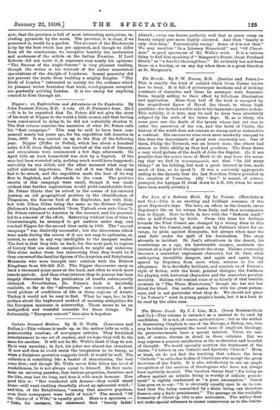The Herods. By F. W. Farrar, D.D. (Service and Paton.)—
This is exactly the kind of subject which Dean Farrar knows how to treat. It is full of picturesque incidents and of striking contrasts of character, and these he arranges with dramatic force, largely adding to their effect by felicitous illustration and application. More than half of the book is occupied by the magnificent figure of Herod the Great, to whose high qualities—for he had a noble side to his character—justice is done. This nobility, it is true, may be said to have been absolutely eclipsed by the evils of his latter days. If, as is likely, the same year saw the death of the tyrant whose last act was to order the execution of his son, and the birth of Christ, tho history of the world does not contain so strong and so instructive a contrast. His successors were even more markedly unequal to him than the descendants of great men commonly are. One of them, Philip the Tetrarch, was an honest man; the others had almost as little ability as they had goodness. The Dean draws a very vivid picture of the death of John the Baptist. (Is it not possible that the wohiai iro;et of Mark vi. 20 may have the mean- ing that we find in iroXtrrpwyp.ove7Y, not that "he did many things" at his bidding, but took a great interest in him, made much of him, so to speak ?) It was a curiously appropriate ending to the dynasty that the last Herodian Prince perished in the eruption of Vesuvius. (By " last " is meant, of course, youngest, for Agrippa II. lived down to A.D. 100,, when he must have been nearly seventy.)






































 Previous page
Previous page